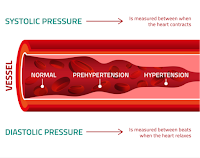High blood pressure
High blood pressure, also referred to as hypertension by your doctors, is a common problem in the world nowadays. If you have high blood pressure, this means that the blood is pushing with too much force against your blood vessels, and this can put you at risk for various heart conditions.
In terms of numbers, normal hypertension is said to be less than 120 over less than 80 according to the 2017 American College of Cardiology/American Heart Association (ACC/AHA). Elevated blood pressure is 120-129 over less than 80, then stage 1 hypertension 130 to 139 over 80 to 89 and stage 2 hypertension at least 140 over at least 90.
https://www.statpearls.com/CmeImg/RetrieveImage/704
There are two types of hypertension: primary and secondary hypertension. The causes of primary hypertension remain unclear whereas secondary hypertension is caused by certain underlying conditions such as chronic renal disease, pheochromocytomas or sleep apnea.
Risk factors
Risk factors for
developing hypertension include obesity, smoking, excessive alcohol
consumption, physical inactivity, stress, high sodium (can be from food), low
potassium, and conditions such as kidney conditions and diabetes, as well as
pregnancy.
https://faithhearing.com/wp-content/uploads/2021/07/singapore-hypertension-causes-primary-essential-secondary-876x657.png
Management
As an individual, only
you can look after your health. In managing high blood pressure, one can adopt
these lifestyle modifications in addition to the medication prescribed by your
physician. Lose weight, reduce sodium intake and potassium intake, eat food
rich in potassium, exercise and take your medications regularly.
Medication
Hypertension is managed
by drugs that target different enzymes and proteins explained as follows:
·
Angiotensin-converting enzyme (ACE)
inhibitors prevent the production of angiotensin II (ANG II) which functions to
narrow blood vessels. ACE inhibitors help relax blood vessels to lower blood
pressure and they include Enalapril and Captopril.
·
ANG II receptor blockers prevent ANG II
from binding with receptors in blood vessels preventing the narrowing of blood
vessels. These drugs include Metoprolol
and Losartan.
·
Calcium channel blockers which are drugs
that block protein channels that allow calcium to enter blood vessels and heart
muscles allowing relaxation of blood vessels. These drugs include Amlodipine
and Nifedipine.
·
Diuretic drugs aka, “water drugs”, help by getting
rid of excess sodium (salt) and water from the blood, reducing the amount of
fluid in the blood and therefore reducing blood pressure. These drugs include Indapamide
and Chlorothiazide.
Sources
1.
https://doi.org/10.1186/2042-6410-3-7
2.
https://doi.org/10.1093/ajh/hpu083
3.
https://www.ahajournals.org/doi/full/10.1161/CIRCRESAHA.116.303603






.jpg)

No comments:
Post a Comment